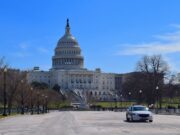One day after a House Ways and Means Oversight Subcommittee hearing brought new revelations to the IRS targeting scandal, the House Oversight and Government Reform Committee’s Subcommittee on Economic Growth, Job Creation and Regulatory Affairs heard from witnesses with first-hand knowledge of IRS harassment, setting the stage for yet another round of fighting between Democrats and Republicans over the legitimacy of the scandal that’s rocked the IRS since May of last year.
During the hearing, Catherine Engelbrecht, Cleta Mitchell, Becky Gerritson, and Jay Sekulow shared their experiences with the scandal and fielded questions from the Subcommittee members for approximately two hours. Ms. Mitchell and Mr. Sekulow are lawyers who represent groups that were targeted, while Ms. Engelbrecht and Ms. Gerritson are founders of groups that experienced harassment when seeking tax-exempt status in the form of lengthy delays and improper and intrusive questioning about their organizations’ membership and activities. The Subcommittee also invited Barbara Bosserman, the Department of Justice trial attorney heading up DOJ’s investigation of the scandal, but she declined to appear. Bosserman has recently come under criticism from some Republicans on the House Oversight Committee for contributions she’s made to President Obama’s past campaigns.
Ms. Engelbrecht said that her family business faced harsh treatment from bureaucratic agencies that had never occurred prior to founding her tax-exempt organization, True the Vote. After nearly twenty years of operating without interference, Ms. Engelbrecht suddenly had multiple government agencies showing up at her home and business with investigations and audits once she started exercising her First Amendment rights. The Democratic members of the Subcommittee took issue with Ms. Engelbrecht’s testimony, and the hearing in general. They argued that anecdotes don’t make good evidence, and that the Republicans had organized the hearing simply to offer a platform for Tea Party groups to make the Obama administration look bad.
It’s true that the stories of four witnesses are not proof of a wide-reaching scandal, but you can’t find evidence unless you look for it. As Mr. Sekulow and Ms. Mitchell noted, none of the many groups they represent have been interviewed by any federal investigators. The Democratic members, much like President Obama when he asserted on Sunday that there was “not even a smidgeon of corruption” in the targeting, seem to be putting the cart in front of the horse. We can’t conclude corruption played no role until we conclude the investigation, which is still ongoing.
This is not to say the problem with the investigation is simply pushback from Democrats. Both parties seem to be exactly where they were when the scandal first broke: Democrats trying to separate their party and President from it, while Republicans try to use it to score political points against the Obama administration. As a result, Democrats resist robust investigations while Republicans only seek out facts that fit their narrative. Neither is primarily seeking the truth, and it shows in the investigation’s lack of progress.
To a certain extent, this is just how American politics works: the parties compete for voters, giving them an incentive to expose each other’s bad behavior, which leads to a more informed public and improved public policy. However, that process is far from perfect, as this scandal has made painfully clear. A driving incentive for Republicans to investigate the IRS is that it helps them embarrass and defeat the Democrats. As a result, they are prone to miss facts that don’t fit their narrative, and may choose not to investigate thoroughly, if they can embarrass the Democrats without those facts. Political parties always take the path of least resistance, and from the Democratic perspective, that’s exactly what Thursday’s hearing was: a platform for four witnesses with Tea Party backgrounds to blast the Obama administration with anecdotes in lieu of evidence. The scant discussion of how to improve the IRS during Thursday’s meeting would support the view that Republicans are more interested in blaming someone than in solving the problems the scandal exposed. (Although the witnesses were in broad agreement that the agency’s proposed rulemaking would make speaking out much more difficult for 501(c)(4) organizations).
This criticism comes with caveats. Just like the Democrats can’t know whether there’s evidence of corruption until the investigations are concluded, neither can I know whether the investigations will ultimately uncover all the facts until they are concluded. With multiple Congressional investigations still ongoing, my pessimism may well be premature. Indeed, at yesterday’s hearing, Republicans were irate that the IRS was refusing – or failing – to fulfill information requests relevant to their investigations. Being aware of the incentives faced by political parties is primarily valuable because it gives us a way of understanding where safeguards for our rights are most likely to fail, and consequently where citizens ought to focus their efforts to influence public policy.
Overall, Congress deserves praise for at least holding these hearings. They keep the very troubling scandal in the public’s eye and on the agenda. They also force politicians to talk face-to-face with those whose rights have been violated by the federal government. That should be a push towards better policy, even if it’s not a strong enough one to get us all the way there. For those following the scandal regularly, however, the glacial pace of the investigation and the constant partisan bickering between parties is hard to tolerate.














